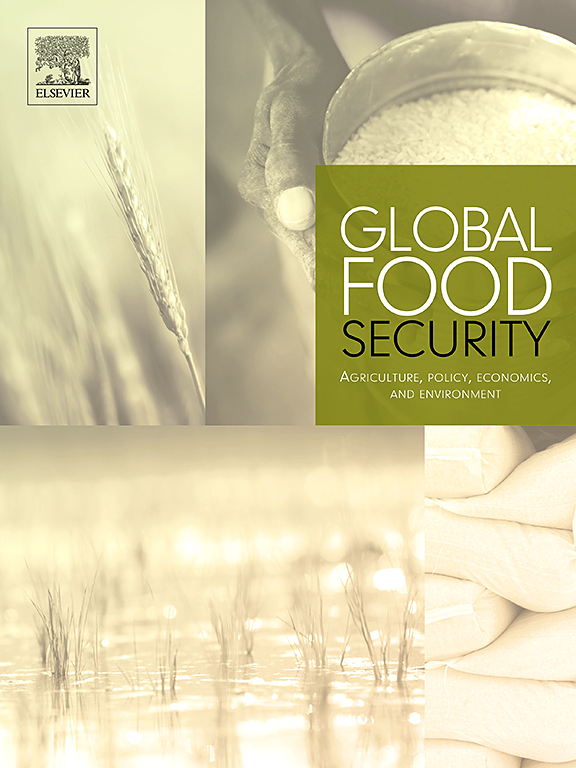俄罗斯-乌克兰战争及其他全球危机引发的价格冲击和相关对策:来自六个非洲国家的证据
IF 9.6
1区 经济学
Q1 FOOD SCIENCE & TECHNOLOGY
Global Food Security-Agriculture Policy Economics and Environment
Pub Date : 2025-04-18
DOI:10.1016/j.gfs.2025.100861
引用次数: 0
摘要
近年来,农粮系统受到了大量冲击,尤其是对中低收入国家而言。这些冲击包括 Covid-19 大流行病、俄乌战争以及气候变化的各种表现等等。本文定量探讨了 2019 年以来燃料、化肥和粮食价格冲击的性质,并定性分析了加纳、肯尼亚、尼日利亚、塞内加尔、坦桑尼亚和津巴布韦这六个非洲国家采取的政策应对措施。结果证实,所有六个国家的主要粮食(玉米、大米、小麦和植物油)、燃料和化肥价格都明显上涨,其中 2022 年的涨幅最快。我们完成了对相关政策应对措施的案头审查,并对六个国家的政策制定者和其他主要利益相关者进行了 104 次半结构化访谈,以了解他们在应对近期和持续冲击的政策方面的经验和观点。这些访谈提出了几个主题(1) 自 2020 年以来,政策越来越强调粮食和化肥的自给自足;(2) 虽然补贴和关税减免是现成的应对政策,但财政负担可能相当高;(3) 应对冲击的政策有时缺乏连贯性,一些政策抵消了其他政策的影响;(4) 虽然最近的冲击引发了一些贸易调整,但并没有刺激非洲内部(区域内)贸易的增长;以及 (5) 决策者对有机肥料表现出越来越高的评价,并在制定化肥政策时越来越认识到气候变化和相关的环境压力。总之,这些研究结果突出表明,有必要就国家自给自足与参与国际贸易之间最恰当的平衡进行更多讨论。本文章由计算机程序翻译,如有差异,请以英文原文为准。
Price shocks and associated policy responses stemming from the Russia-Ukraine War and other global crises: Evidence from six African countries
Recent years have brought a deluge of shocks to agrifood systems, particularly for low- and middle-income countries. These include the Covid-19 pandemic, the Russia-Ukraine War, and manifestations of climate change, among others. This paper quantitatively explores the nature of price shocks in fuel, fertilizer, and foods since 2019 and qualitatively characterizes the policy responses undertaken in six African countries, namely Ghana, Kenya, Nigeria, Senegal, Tanzania, and Zimbabwe. Results confirm that prices for key foods (maize, rice, wheat, and vegetable oil), fuel, and fertilizer increased markedly in all six countries, with the most rapid increases arriving in 2022. We completed a desk review of relevant policy responses and conducted 104 semi-structured interviews with policy makers and other key stakeholders across the six countries to understand their experiences with, and perspectives on, policy responses to recent and ongoing shocks. These interviews surfaced several themes: (1) Policies exhibit an intensifying emphasis since 2020 on self-sufficiency in food and fertilizer; (2) Though subsidies and tariff reductions are a readily available policy response, the fiscal burden can be quite high; (3) Policy responses to shocks sometimes lack coherence, with some policies offsetting the others’ impacts; (4) While recent shocks triggered some trade realignment, they have not stimulated increased within-Africa (intra-regional) trade; and (5) Policy makers exhibit an increasing appreciation for organic fertilizer and increasingly recognize climate change and associated environmental stress when shaping fertilizer policy. Altogether, these findings underscore a need for more discourse on the most fitting balance between national self-sufficiency and participation in international trade.
求助全文
通过发布文献求助,成功后即可免费获取论文全文。
去求助
来源期刊

Global Food Security-Agriculture Policy Economics and Environment
FOOD SCIENCE & TECHNOLOGY-
CiteScore
20.90
自引率
3.40%
发文量
69
期刊介绍:
Global Food Security plays a vital role in addressing food security challenges from local to global levels. To secure food systems, it emphasizes multifaceted actions considering technological, biophysical, institutional, economic, social, and political factors. The goal is to foster food systems that meet nutritional needs, preserve the environment, support livelihoods, tackle climate change, and diminish inequalities. This journal serves as a platform for researchers, policymakers, and practitioners to access and engage with recent, diverse research and perspectives on achieving sustainable food security globally. It aspires to be an internationally recognized resource presenting cutting-edge insights in an accessible manner to a broad audience.
 求助内容:
求助内容: 应助结果提醒方式:
应助结果提醒方式:


